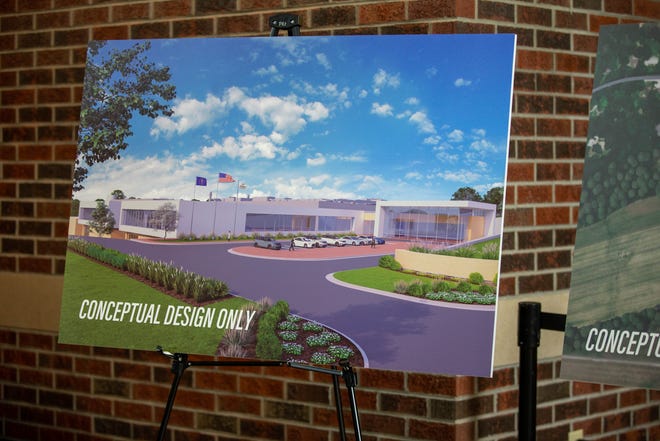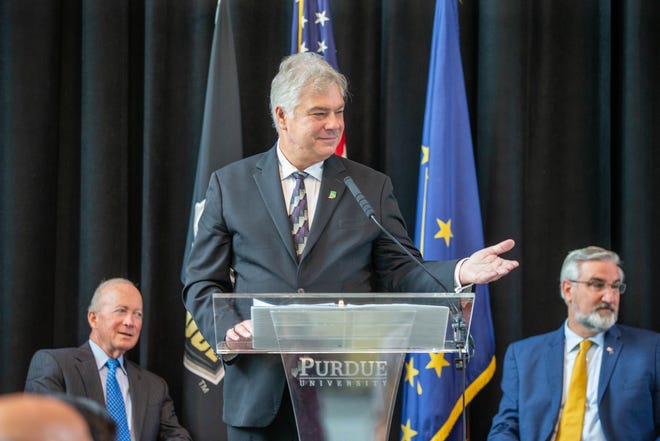LAFAYETTE, Ind. — Last month, the City of West Lafayette received the monumental news that SkyWater Technology planned to open a $1.8 billion state-of-the-art semiconductor manufacturing facility in Discovery Park District at Purdue University.
The enterprise promises to inject money to the county's economy and create around 750 new jobs for the area.
But after the excitement from the news began to simmer down, one question began to emerge: With the arrival of SkyWater Technology and other potential industries looking to move into Tippecanoe County, is there enough housing to support the added labor force that would eventually exist within the county?

Much of this concern stems from the housing shortage that Tippecanoe County some are experiencing, as the average cost for an apartment has increased over the past year, and as supply has diminished from the demand from both Purdue University students and new residents moving into the area.
Housing has become a premium commodity in the area.
Purdue University’s 2022 enrollment saw more than 50,000 undergraduate and graduate students attending the campus, the largest number in Purdue history.
Purdue currently has around 15,500 housing spots, both in on-campus housing and leased beds to offer to students, around 34,500 students may potentially need to look for housing within the county.
And although the SkyWater deal is still early on in its development, if the growing issue of housing isn’t addressed before the facility opens, the Greater Lafayette area may be in trouble regarding housing in the near future
The Journal & Courier reached out to local leaders and academics to ask that question −how can the city of West Lafayette prepare for the increasing need for housing?
Housing economist's input on the matter
Mike Eriksen, professor of economics and director of the new Dean V. White Real Estate Finance Program at Purdue University’s Krannert School of Management, researches low-income housing markets. He’s worked on projects relating to the low-income housing tax credit program, housing vouchers, home safety modifications and homeownership assistance grants.
For Eriksen, the idea of SkyWater Technology developing a new industry in West Lafayette reminded him of Silicon Valley.
When asked about how the county should approach the housing shortage and need for development within the area, Eriksen highlighted the importance of learning from the mistakes that have occurred in Silicon Valley, specifically the need for high-density housing.

“Instead of being worried about that growth, you should be asking, how do you embrace it and kind of create equally equitable growth in some sense? Where you have policies where everybody benefits from it,” Eriksen told the Journal & Courier.
“What Silicon Valley did wrong, and to the extent California, was that they made a commitment early on to not allow density.
“The challenge you got with that is, California became this urban sprawl. It was the worst of both worlds; they have urban sprawl and at the same time they have really unaffordable housing, which is what we don’t want in Lafayette.
“And I think how we do that, the important constraint in the opportunity here is allowing density to occur, but in a planned, meaning fashion.”
Eriksen highlighted that if West Lafayette were to create a few high-destiny apartment complexes in a planned manner, not only would it address the housing situation regarding students, but it could solve potential future housing issues that the city might encounter.
Infrastructure is key
Eriksen also said that in order to have high-density housing within Lafayette or West Lafayette, one major problem many smaller cities face − whether the infrastructure can handle a sudden increase in the population − must be addressed.
For example, the sewage system many small cities utilize may not be able to handle a sudden increase in waste, and in turn, the development of high-density housing could cause more issues than it would solve.
Eriksen believes that in order to prepare a city for a growth in population, city leaders need to be proactive in upgrading the city’s infrastructure, so that when it comes time to expand and grow, the city won’t need to play catch-up with the needs of the city and instead can grow at a steady pace.
Eriksen also acknowledged that, yes, infrastructure construction is annoying for anyone living in the city. But he notes that the few years of annoyance will greatly benefit the community if it’s done in a proactive manner.
Instead of existing homeowners and renters needing to economically fight with new residents for property, if the groundwork for growth has already been addressed, then developers will be able to keep up with demand.
“West Lafayette and Lafayette are really attractive because of its affordability," Eriksen said, "so how do we maintain that, in some sense, is equally as important as how do we attract more jobs?”
Although Tippecanoe County faces a few housing concerns, Eriksen believes that SkyWater Technology’s interest in the county is something worthy of excitement, especially if city leaders are able to proactively prepare for the development of new industries in the area.
“I think this is exciting. Realize how many small towns in America, or even in Indiana, are jealous of that.”
“I always joke that basically every small town or city wants to be the next Silicon Valley or the next Austin.”
Mayor John Dennis: Plan for the future
SkyWater Technology is just the start of West Lafayette's move into the tech industry. The J&C asked West Lafayette Mayor John Dennis his thoughts and plans on how to address the need for growth within the city and surrounding areas.

In a similar manner to Eriksen, Dennis emphasized the importance of having a plan for the growth of West Lafayette.
“Good city management is having a plan for the now, learning from the past and obviously having a plan for the future,” said Dennis.
“We have to make sure our growth is done in a fashion that allows us to be able to handle the dynamic of the population.
“Imagine, hypothetically, if three major industries came to our community here in West Lafayette, each employing 1,000 people. Think about that, that’s 3,000 more people, that’s 3,000 potential cars, 3,000 potential more families, and that has a massive impact on the city and our ability to provide high-quality services.
“Everything we do here has to be planned in advance.”
Dennis highlighted that over the past decade, he and his team have tried to tackle the increased desire to live in West Lafayette by approving housing projects and infrastructure projects to go along with that desire.
He does, however, recognize the city’s current population density can be spotted on a daily basis. The idea of a traffic jam in West Lafayette was unheard of back in the day, but it's now more common.
The idea of high-density housing is something Dennis was opposed to considering, but he also recognized alternative housing projects may suit the city.
“As our population dynamic changes, as we get more people coming to this community, high-density housing, sure, we’ll have to give that some look. But what high-density housing looks like, that’s a conversation we need to have in the future," Dennis said.
"I don’t know if we're going to have a stack 18 stories high, there might be like what we’re doing on the north end in conjunction with Purdue. Housing projects that represent some of the linear housing that they had in England or Dublin.”
The mayor didn't offer a specific plan −not out of an inability to conjure up a strategy, but rather by highlighting the new chapter that West Lafayette is entering as a city. In essence, Dennis spoke to the need to sit down with city and county leaders to determine what’s next for West Lafayette and the county as a whole.
“Like Silicon Valley in California, that didn’t just start because someone had a great idea," he said. "It was methodically planned. There were people who are really smart about that stuff and said, OK, look at what we got here. We got something that’s going to require people, it's going to require housing, amenities, utilizes, and it's going to require management and leadership,”
“We are now right there in that same conceptional stage of our growth. We need to make sure that we keep the proverbial eyes on the prize, and it can’t be Pacman-esque, where we’re asking for more, more, more. We have to make sure growth is done in a sustainable fashion.”
By Noe Padilla
